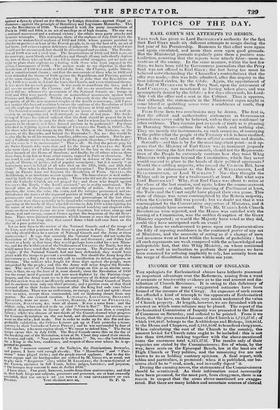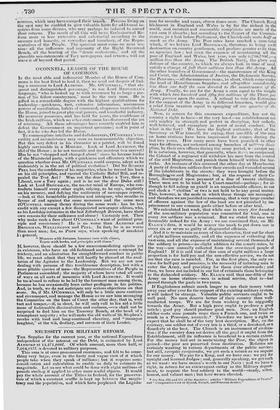INCOME OF THE CHURCH OF ENGLAND.
THE apologists for Ecclesiastical abuses have hitherto possessed an important advantage over the Reformers, arising from a want of accurate or trustworthy evidence as to the real amount and dis- tribution of Church Revenues. It is owing to this deficiency of information, that so many exaggerated estimates have been formed of the incomes of the Clergy. An exposure of such errors has afforded a kind of triumph to the opponents of Ecclesiastical Reform ; who have, on their side, very much underrated the value of Church property. At length, however, we are furnished with an account on which some reliance may be placed. The report of the Ecclesiastical Commission of Inquiry was presented to the House of Commons on Saturday, and ordered to be printed. From it we learn, that the gross annual Income of the Church is 3,723,273/.; of which 180,462/. belongs to the Archbishops and Bishops, 350,8611. to the Deans and Chapters, and 3,191,9501. to beneficed clergymen. When calculating the cost of the Church to the country, the amount levied fur Church-rates ought to be included : this is not less than 600,0001. making together with the above-mentioned sums the enormous total 4,323,2731. The results only of their inquiries are stated by the Commissioners; five of whom, by the way, have seats on the Episcopal Bench, ten at the least are of High Church or Tory politics, and the remaining five are not known to us as holding contrary opinions. A final report, with tables and particulars, is promised: when it is published, our bit. siness shall be to " read, mark, and inwardly digest" it.
During the ensuing recess, the statements of the Commissioners should be scrutinized. As their info'rmation must necessarily have been procured, for the most part, from clergymen, there is no reason to suspect that the sums above-mentioned are exagge- rated. But there are many hidden and uncertain sources of clerical revenue, which may have escaped their search-. Persons living on the spot may be enabled to give val uable hints fee additional in- quiries from some divines, who may perhaps be induced to amend their returns. The result of all this will be an Ecclesiastical Re- form more or less extensive and substantial according to the courage and honesty, or cowardice and treachery, of the Repre- sentatives of the People. The question must come on next ses- sion: all the influence and ingenuity of the Rieht Reverend Bench, all the beating of the "drum ecclesiastic," and all the plausible misstatements of Tory newspapers and reviews, will not stave it off beyond that period.





















 Previous page
Previous page